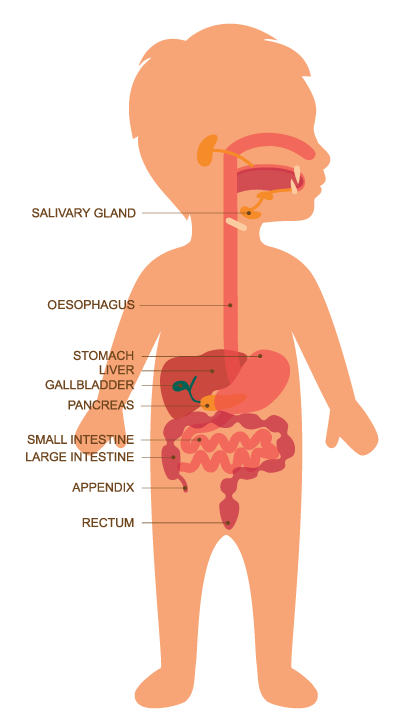Does your child always complain of an upset stomach? Are his bowel habits out of control sometimes? As parents, you may be wondering what makes his tummy tick and how to improve his digestive health.
Foremost, you need to know what the digestive system does; it helps to break down food into energy and basic nutrients to be delivered to every cell in the body via the bloodstream. The digestive tract, which is part of this system, starts at the mouth and ends at the anus. Organs involved include the stomach, small intestine, pancreas, liver, gallbladder, and large intestine (bowel). So what is it about the digestive system that makes it so important?
Gateway to Health
The health of your child’s digestive system is extremely important to his/her overall well-being. This is attributed to the fact that our digestive health is intimately linked to our immune, endocrine, circulatory and central nervous systems. Failure of the digestive system to work properly may result in impaired function of other parts of the body as well.
Poor gut health, which mostly involves bad dietary choices and habits, can lead to many gastrointestinal (GI) symptoms such as constipation, diarrhoea, indigestion and bloating.
These symptoms may be an indication of a more serious health problem but is often misinterpreted and their impact and significance to health misunderstood because they are so commonly seen in children.
Eat Well, Live Well
The foods we eat provide us more than just nutrients and energy; they also play an important part in regulating the physiological processes of the body and also help in promoting health. It is important to note that a diet which is balanced, moderate and full of variety is the best choice for your child.
Digestive system’s awesomeness!
- Our gastrointestinal tract produces about two litres of saliva every day.
- Surface area of the small intestine is almost the size of a tennis court!
Having said that, some foods can be beneficial to your child’s digestive health:
Probiotics
Probiotics are live bacteria that are good for health – though you don’t necessarily need them to be healthy. Existing ‘good’ bacteria in your body help to move food through your gut and lower the amount of ‘bad’ bacteria that can cause problem.
Good examples of foods which contain probiotic bacteria include fermented vegetables such as sauerkraut and kimchi; tempeh; acidophilus milk; and fermented milk products such as yoghurt.
There are no specific dietary guidelines for the amount of probiotics a child should consume daily. However, probiotic research usually reports the amount they use to exert a specific health affect.

Dietary Fibre
Fibre is an important part of a healthy balanced diet. Dietary fibre can help in normalising bowel movement (no constipation or diarrhoea), lowering cholesterol levels, control blood sugar levels, maintain healthy weight and overall bowel health.
There are a variety of rich fibre sources such as wholemeal bread, whole grain cereals, brown rice, all kinds of fruits and vegetables, beans and oats. The Malaysian Dietary Guidelines recommend that the amount of fibre intake should range from 20 to 30g per day.

Prebiotics
Prebiotics are not bacteria, they are non-digestible carbohydrates classed under dietary fibre that feed probiotic bacteria and assist in its growth. Some examples of prebiotic sources include bananas, onions, leeks, soybeans, sweet potatoes, asparagus and some whole grains (e.g. barley, oatmeal and wheat). There are no general dietary recommendations for prebiotics, therefore, include some prebiotic foods as part of your child’s dietary fibre food choice.

Healthy eating habits also affect gut health. Prolonged bad eating habits such as consuming too much salt, sugar and fat, binge eating, late night eating, overeating, etc. should be curbed.
A healthy diet is just part of the solution. You should also encourage your child to be more active. Children require an average of 60 minutes of daily moderate intensity physical activity or a combination of several bouts of more vigorous aerobic exercises. Routine physical activities can help:
- encourage “good” bacteria to thrive in the gut
- maintain regular bowel movement and prevent constipation
- improve nutrient absorption
Being more physically active can also help your child maintain a normal BMI and lower blood glucose and cholesterol levels. This will reduce your child’s future risk of cardiovascular diseases, diabetes, obesity, colon and breast cancer as well as numerous digestive diseases.
Lifestyle choices and habits play a significant role in maintaining gut health. Help your child make the right gut-healthy choices today!
An educational collaboration with Nutrition Society of Malaysia.







Comments